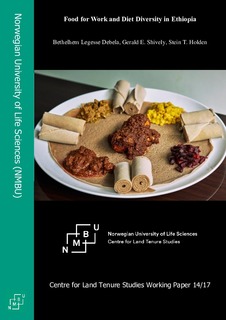Location
NMBU's mission is to contribute to the well-being of the planet. Our interdisciplinary research generates innovations in food, health, environmental protection, climate and sustainable use of natural resources.
About NMBU
NMBU's research is enabling people all over the world to tackle the big, global challenges regarding the environment, sustainable development, how to improve human and animal health, renewable energy sources, food production, and land- and resource management.
Members:
Resources
Displaying 16 - 20 of 98A comment on changes in the Norwegian Land Consolidation Act
The Land Consolidation Act has recently been revised. The changes came
into force on 1 July 2006 and 1 January 2007. The main changes in the Act are that
the land consolidation court now has formal jurisdiction to handle land consolidation
cases for all types of properties independent of location, unless particular cases are
specifically removed from the court's jurisdiction in the Act. The Act provides for
two new types of land consolidation cases in Section 2. The paper analyzes these
different revisions.
Can the land rental market facilitate smallholder commercialization? : evidence from northern Ethiopia
The paper utilizes household panel data to investigate whether the land rental market can facilitate improved access to land for land-poor tenant households over time and thereby facilitate expansion of their farming activity. The paper utilizes data 8-17 years after land certification to assess the long-term effect of land certification on the allocative efficiency in the land rental market in areas where land certification stimulated land renting in the early years after certification.
Probability weighting and input use intensity in a state-contingent framework
Climate risk represents an increasing threat to poor and vulnerable farmers in drought-prone areas of Africa. This study assesses the fertilizer adoption responses of food insecure farmers in Malawi, where Drought Tolerant (DT) maize was recently introduced. A field experiment, eliciting risk attitudes of farmers, is combined with a detailed farm household survey. A state-contingent production model with rank-dependent utility preferences is estimated.
The importance of Ostrom's design principles : youth group performance in Northern Ethiopia
Youth unemployment and migration are growing challenges that need more political attention in many countries, particularly countries with rapid population growth and economic transformation. Proactively mobilizing the youth as a resource in the creation of sustainable livelihoods can potentially be a win-win-win solution that Ethiopia is currently attempting. The new youth employment strategy includes allocation of rehabilitated communal lands to youth groups.
Food for work and diet diversity in Ethiopia
We use four waves of panel data from Northern Ethiopia to investigate the link between Food for Work (FFW) participation and the diversity of food consumption and production. Food-based transfer programs have become a standard tool for addressing the problem of chronic food insecurity in developing countries. Such programs have the potential to expand diet diversity if food items provided under FFW are not part of the beneficiaries’ staple diet. By raising effective incomes, cash payments also have the potential to “crowd in” purchases of nutritionally important foods.






